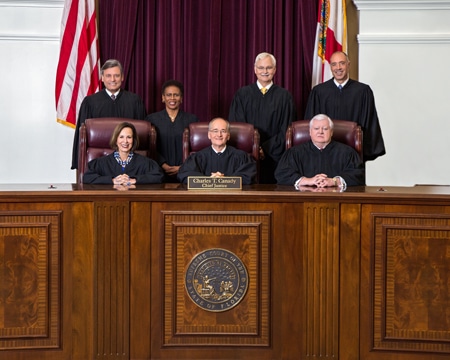TALLAHASSEE — Gov. Rick Scott on Tuesday started what will be a closely watched process to replace three Florida Supreme Court justices who will retire in January, with the appointments possibly leading to a major ideological shift on the court.
Scott said he asked the Supreme Court Judicial Nominating Commission to begin a process that includes accepting and reviewing applications, interviewing candidates and making nominations for appointment. The process will lead to replacements for longtime justices Barbara Pariente, R. Fred Lewis and Peggy Quince, who are required to leave the court in January because of reaching a mandatory retirement age.
Appointments of Supreme Court justices are always important, but Pariente, Lewis and Quince — along with Justice Jorge Labarga — are widely considered a left-leaning majority on the seven-member court. That has led to the possibility that their replacements could spur a rightward shift of the court.
As a sign of that, a legal debate emerged last year about whether Scott, who will also leave office in January, should have the authority to appoint the new justices or whether that power should go to his successor. Scott, a Republican, has appointed one justice, Alan Lawson, who is generally aligned with what is viewed as the conservative minority on the court.
Scott has argued that he has the authority to appoint the new justices, but the League of Women Voters of Florida and Common Cause filed a case last year arguing that Scott’s successor should make the picks. The Supreme Court dismissed the case in December, saying the issue wasn’t “ripe” for consideration because Scott had not acted on the appointments.
But the dismissal of the case does not preclude another challenge to Scott’s position that he has the authority to make the appointments.
In the announcement Tuesday, Scott’s office said he would invite the governor-elect to interview the court nominees after the general election. The governor’s office pointed to an “expectation” that Scott and his successor would be able to agree on appointments.
If that happens, it would follow the lead of outgoing Democratic Gov. Lawton Chiles and Republican Gov.-elect Jeb Bush in late 1998 agreeing to appoint Quince to the Supreme Court.
The chances of reaching agreement, however, could hinge heavily on the outcome of the Nov. 6 gubernatorial election between Democrat Andrew Gillum and Republican Ron DeSantis. Gillum is running as a progressive Democrat and, if elected, might have a hard time reaching agreement with the conservative Scott. The new governor will take office Jan. 8.
The nine-member Judicial Nominating Commission will have 60 days — expiring shortly after the election — to nominate a list of three to six people for each court vacancy.
“To minimize or avoid any period of vacancy on the Supreme Court, the nominating process must begin well in advance of these vacancies,” Scott said in a prepared statement Tuesday. “Beginning the process to fill these vacancies right now follows the practice of previous governors. Florida’s Supreme Court is so important to Floridians, and we will work together to select the most qualified justices to faithfully serve our state.”
The state Constitution requires justices to retire at age 70 or shortly after, depending on where they are in their terms. Along with the joint pick of Quince, Chiles appointed Pariente to the Supreme Court in 1997 and Lewis to the court in 1998.
Chief Justice Charles Canady, Justice Ricky Polston and Labarga were appointed to the court by then-Republican Gov. Charlie Crist in 2008 and 2009.

